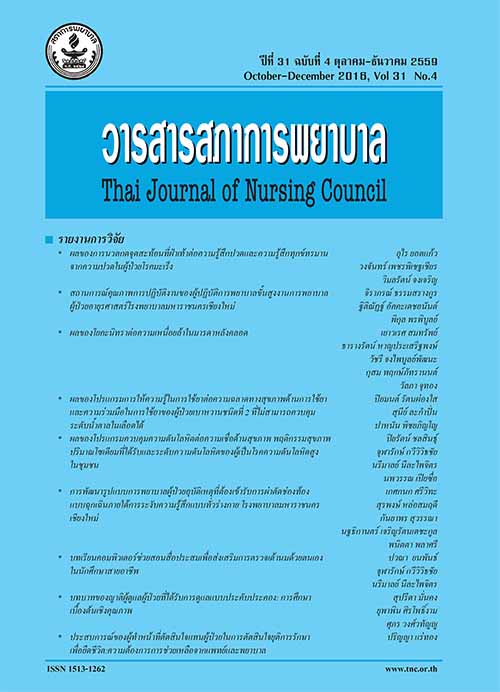ผลของโปรแกรมการให้ความรู้ในการใช้ยาต่อความฉลาดทางสุขภาพด้าน การใช้ยาและความร่วมมือในการใช้ยาของผู้ป่วยเบาหวานชนิดที่ 2 ที่ไม่สามารถควบคุมระดับน้ำตาลในเลือดได้
Keywords:
ผู้ป่วยเบาหวำนชนิดที่ 2 ที่ไม่สามารถควบคุมระดับน้ำตาลในเลือดได้, โปรแกรมการให้การศึกษาในการใช้ยา, ความฉลาดทางสุขภาพด้านการใช้ยา, ความร่วมมือในการใช้ยา, uncontrolled type 2 diabetic patients, medication literacy programme, health literacy on medicationAbstract
บทคัดย่อ: วัตถุประสงค์การวิจัย: เพื่อศึกษาผลของโปรแกรมกำรให้การศึกษาในการใช้ยาต่อ
ความฉลาดทางสุขภาพด้านการใช้ยาและความร่วมมือในการใช้ยาของผู้ป่วยเบาหวานชนิดที่ 2 ที่ไม่สามารถควบคุมระดับน้ำตาลในเลือดได้
การออกแบบการวิจัย: การวิจัยกึ่งทดลอง
การดำเนินการวิจัย: กลุ่มตัวอย่างคือ ผู้ป่วยเบาหวานชนิดที่ 2 ที่มารับบริการที่เครือข่ายบริการสุขภาพของโรงพยาบาลหนองเสือ 4 แห่ง กลุ่มทดลองจำนวน 29 คนได้รับโปรแกรมการให้การศึกษาในการใช้ยาจำนวน 2 ครั้ง กลุ่มควบคุมจำนวน 29 คนได้รับการดูแลตามปกติจากคลินิกโรคเรื้อรัง วิเคราะห์ข้อมูลส่วนบุคคลด้วยสถิติพรรณนำ และทดสอบสมมติฐานด้วย repeated measure ANOVA, Bonferroni และ independent t-test,
ผลการวิจัย: หลังการทดลอง กลุ่มทดลองมีคะแนนความฉลาดทางสุขภาพด้านการใช้ยาดีกว่าก่อนการทดลองและดีกว่ากลุ่มควบคุมอย่างมีนัยสำคัญทางสถิติ (p-value <.05) ที่ระยะติดตามผล กลุ่มทดลองมีคะแนนเฉลี่ยความฉลาดทางสุขภาพด้านการใช้ยาลดลงจากหลังการทดลองแต่มากกว่า
ก่อนการทดลอง และไม่แตกต่างจากกลุ่มควบคุม ภายหลังการทดลองกลุ่มทดลองมีคะแนนเฉลี่ยความร่วมมือในการใช้ยาดีกว่าก่อนการทดลอง (p-value <.05) แต่ไม่แตกต่างจากกลุ่มควบคุม ที่ระยะติดตามผล กลุ่มทดลองมีคะแนนเฉลี่ยความร่วมมือในการใช้ยาไม่ต่างจากหลังการทดลองแต่ดีกว่าก่อนการทดลองอย่างมีนัยสำคัญทางสถิติ (p-value <.05) แต่ไม่แตกต่างกับกลุ่มควบคุม
ข้อเสนอแนะ: พยาบาลสามารถนำโปรแกรมนี้ไปประยุกต์ใช้เพื่อเสริมสร้างความฉลาดทางสุขภาพด้านการใช้ยาและความร่วมมือในการใช้ยา
Abstract: Objective: To study how a medication literacy programme could impact the health
literacy on medication and medication adherence in uncontrolled type 2 diabetic patients.
Design: Two-group experimental research with a pre-test and a post-test.
Implementation: The sample consisted of 58 type 2 diabetic patients receiving medical
treatment at 4 health service stations of Nongsuea Hospital. The patients were equally divided
into an experimental group and a control group. The experimental group participated in the medication
literacy programme which emphasised medication-oriented intellectual development skills and
social and communication skills. The programme was administered twice, 1 week apart. In the 4th
and 8th weeks after the administration, the programme was evaluated and followed up, respectively.
The control group, on the other hand, received standard care from the Chronic Disease Clinic. Data
were collected by means of a self-completed questionnaire and clinical records obtained with permission
from the Medical Registration Offce. Descriptive statistics was used to anayse personal data, whilst
Repeated Measure ANOVA, Bonferroni and independent t-test were employed for hypothesis testing.
Results: After the experiment, the experimental group displayed a signifcant increase
in their score for health literacy on medication, which was also signifcantly higher than that
of the control group (p-value < .05). During the follow-up period, the experimental group’s
score for health literacy on medication decreased from that recorded after the experiment, but
was still signifcantly higher than their pre-experiment score (p-value < .05). However, no
signifcant difference (p-value < .05) was found between the experimental group and the
control group in terms of their follow-up period scores for health literacy on medication.
Concerning medical adherence, the experimental group’s post-experiment score was
signifcantly higher than their pre-experiment score (p-value < .05), but was not signifcantly
different from that of the control group. During the follow-up period, the experimental group’s
average score for medical adherence did not signifcantly differ from that recorded after the
experiment, but was still signifcantly higher than their pre-experiment score (p-value < .05).
However, there was no signifcant difference (p-value < .05) between the experimental group’s
and the control group’s follow-up period scores for medication adherence.








